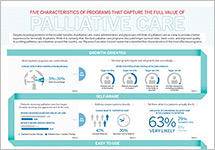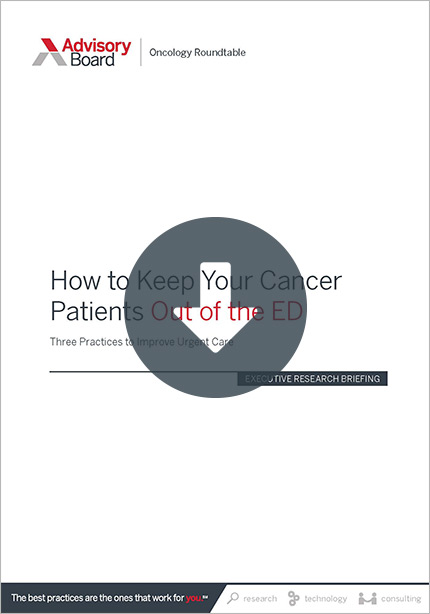Auto logout in seconds.
Continue LogoutEditor's note: This popular story from the Daily Briefing's archives was republished on Oct. 5, 2018.
Writing in the New York Times, Kate Bowler, an assistant professor at Duke Divinity School who has stage IV cancer, reflects on her awkward encounters with friends who don't know how to talk about her disease—and offers suggestions for what to say "when you meet the Angel of Death at a party."
Download URMC's patient question prompt list for end-of-life care
The challenges of making small talk with the 'Angel of Death'
Bowler was diagnosed with colon cancer about two and a half years ago, at age 35, and undergoes scans every three months to determine whether her cancer is spreading. If the scan is clear, "I live for three months, take a deep breath and hope to start over again," Bowler explains. "I will probably do this for the rest of my life. Whatever that means."
She finds it nearly impossible to explain to others the "kernel of truth" of her condition: "I am not dying," she writes. "I am not terminal." And yet her condition has no cure: "I stand in the in-between where everyone must pass, but so few can remain."
Her friends and acquaintances seem uncertain of how to speak to someone who's living in that treacherous space between life and death: "When it comes to small talk, I am the angel of death," she writes. "I have seen people try to swallow their own tongue after uttering the simple words 'How are you?' I watch loved ones devolve into stammering good wishes and then devastating looks of pity."
According to Bowler, most of those she speaks with "succumb immediately to a swift death by free association," perhaps mentioning the passing of an "aunt, a neighbor, or a cousin's friend." While this "is not comforting," Bowler acknowledges that she tries "to pay attention because some people give you their heartbreak like a gift." Her favorite nurse, for instance, confided in Bowler that she had lost her baby—a confidence that demonstrated "she knew what it was like to keep marching long after the world had ended."
The 3 problematic ways to speak to an ill patient
The people who do the worst job of speaking about her illness, Bowler writes, "can be lumped into three categories: minimizers, teachers, and solvers."
She explains, "The minimizers are those who think I shouldn't be so upset because the significance of my illness is relative." Bowler notes that their sentences often start with "'Well, at least ...'" For instance, one minimizer told Bowler's sister that Bowler's cancer, she writes, "vastly preferable to life during the Iranian revolution."
Teachers, meanwhile, "focus on how this experience is supposed to be an education in mind, body, and spirit," Bowler writes. One "teacher," told Bowler that he "'hope[d] [she] have a "Job" experience,'" Bowler says, explaining that "God allowed Satan to rob Job of everything, including his children's lives." Bowler asks, "Do I need to lose something more to learn God's character?"
Ultimately, however, "the hardest lessons come from the solutions people, who are already a little disappointed that I am not saving myself," Bowler writes. When it comes to these "solvers," Bowler says, "There is always a nutritional supplement, Bible verse, or mental process I have not adequately tried."
The right way to speak to the 'Angel of Death'
A better response, Bowler states, begins with an acknowledgement of tragedy. According to Bowler, "A tragedy is like a fault line," splitting a "into a before and an after," and "few people will let you admit ... out loud" that "most of the time, the before was better."
While "hope may prevent [people] from acknowledging how much has already been lost," that "acknowledgment is also a mercy," Bowler writes. Something as simple as "Oh, hon, what a year you've had" demands nothing from Bowler "but makes a little space for [her] to stand there in that moment."
Bowler continues, "After acknowledgment must come love." It's a "tricky" balance, as excessive "praise ... can sound a little too much like a eulogy." Still, however, that "impulse to offer encouragement is a perfect one."
These comforting phrases, gifts, and affirmations have "tremendous power," Bowler writes, acting like "anchors that hold me to the present." She concludes, "They say to me, like my sister Maria did on one very bad day: 'Yes, the world is changed, dear heart, but do not be afraid. You are loved, you are loved. You will not disappear. I am here'" (Bowler, New York Times, 1/26).
Oct. 24 webconference: Improve end-of-life care for cancer patients
Learn how to improve end-of-life care by helping cancer patients start conversations about their goals for care, encouraging earlier and standardized use of palliative care, and improving coordination with hospice providers.
Don't miss out on the latest Advisory Board insights
Create your free account to access 1 resource, including the latest research and webinars.
Want access without creating an account?
You have 1 free members-only resource remaining this month.
1 free members-only resources remaining
1 free members-only resources remaining
You've reached your limit of free insights
Become a member to access all of Advisory Board's resources, events, and experts
Never miss out on the latest innovative health care content tailored to you.
Benefits include:
You've reached your limit of free insights
Become a member to access all of Advisory Board's resources, events, and experts
Never miss out on the latest innovative health care content tailored to you.
Benefits include:
This content is available through your Curated Research partnership with Advisory Board. Click on ‘view this resource’ to read the full piece
Email ask@advisory.com to learn more
Click on ‘Become a Member’ to learn about the benefits of a Full-Access partnership with Advisory Board
Never miss out on the latest innovative health care content tailored to you.
Benefits Include:
This is for members only. Learn more.
Click on ‘Become a Member’ to learn about the benefits of a Full-Access partnership with Advisory Board
Never miss out on the latest innovative health care content tailored to you.


